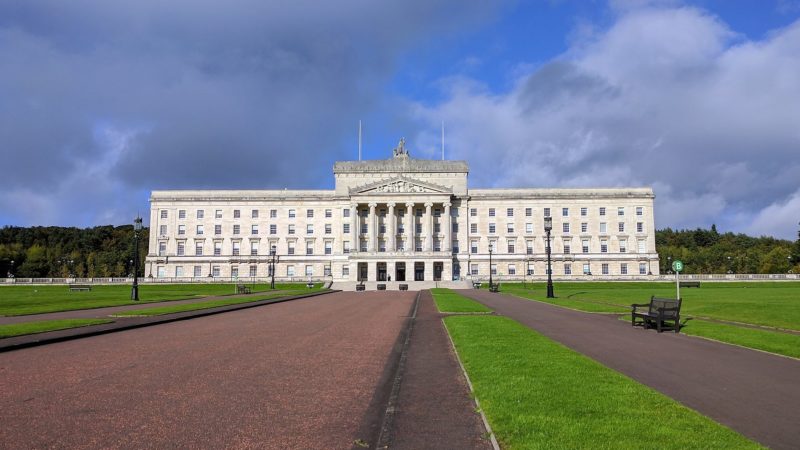
The Good Friday Agreement (GFA) of 1998 was one of the great achievements of international diplomacy; a realisation of years of effort, tough negotiation and compromise across these islands. The Agreement stands as a landmark accomplishment, locking in peace and security.
But with its 25th anniversary on Monday, we must also face up to what has – particularly since Brexit – become a familiar scenario of strained institutions, and an Assembly that’s failed to function.
It’s a time that calls once again for negotiation and compromise to restore government and power-sharing to Northern Ireland. Not only to fix the mistakes of Boris Johnson and maintain peace – but to go further and give the people and institutions of Northern Ireland the long-term stability and prosperity they rightly demand.
The Good Friday Agreement did more than end decades of violence – it gave Northern Ireland’s communities a stake in their own future, creating a framework that protected their respective traditions. It created previously unthinkable partnerships at the heart of government and brought growth, change, free movement and demilitarisation.
Labour remains proud of the hard work of Tony Blair and the late Mo Mowlam in helping build peace in Northern Ireland. It stands as one of the great achievements of any Labour government, while building on the diligence and political courage of Blair’s Conservative predecessor, John Major.Unfortunately, that pride and political courage is not shared by today’s Conservatives.
Michael Gove has shown little remorse for his unreasonable opposition to the Good Friday Agreement. Karen Bradley, who served as Secretary of State for Northern Ireland during the Brexit process was surprised to learn that nationalists don’t vote for unionists, and unionists don’t vote for nationalists.
Theresa Villiers – who I’m running against as Labour’s parliamentary candidate in Chipping Barnet – blithely dismissed concerns regarding the impact of Brexit on the Irish border as “scaremongering”.
It didn’t take long to prove Villiers wrong. Free movement across the island of Ireland quickly emerged as a defining theme of Brexit, demonstrating clearly the benefits that EU membership brought in helping ensure peace.
Partly as a consequence of Brexit, Northern Ireland has been through a long and damaging period of political uncertainty. There has been no power-sharing executive for over a year, and the recent raising of the terrorism threat level, alongside a spate of incidents, demonstrated how fragile peace can be.
We have witnessed so many symbolic steps to build trust, mutual respect and friendship across these islands. Queen Elizabeth II’s state visit to Ireland at which she opened her speech in Irish; President Higgins’ reciprocal visit to UK, in which he paid his respects at the Tomb on the Unknown Soldier; the unlikely camaraderie between Martin McGuinness and Ian Paisley.
But we cannot ignore the fact that events of recent years risk a backsliding of this progress. We must not allow that to happen. Peace and reconciliation is hard, but it is the only way forward.
The recent Windsor Framework is of course to be welcomed, but that alone cannot undo the Tories’ years-long, cavalier approach to Northern Ireland. Rishi Sunak supported the Brexit deal that created the GB-NI trade border when it was politically convenient for him to do so. He should expect no congratulations for simply clearing up his own mess.
As Mowlam, Blair, Bertie Ahern, John Hume, David Trimble and so many others understood, peace is a process. It takes work and doesn’t simply look after itself. Yet from Villiers and Bradley to Gove and Boris Johnson (a man who famously peddled falsehoods about his ‘oven-ready deal’ not creating a trade border within the UK), the Tories have failed to grasp this.
By contrast, Labour regards the Good Friday Agreement and the future of Northern Ireland as a national priority. The issue is particularly close to the heart of Keir Starmer, who spent many years working in Northern Ireland on legal reform and policing. Those experiences provided him with detailed knowledge of Northern Ireland’s communities and profound affection for all those who strive every day to make it a place of peace, stability and shared prosperity.
Northern Ireland has the potential to become a model for coexistence, for how communities previously at odds can cooperate with mutual respect. In the Labour Party, we want to build on peace. We will work to restore power-sharing and good government, enhance British-Irish relations and build Northern Ireland’s economy, for every part of the community.
The irony of Northern Ireland being lauded as unique in respect of its dual-market access that existed for the entire UK pre-Brexit is not lost. It is nevertheless crucial that every advantage is taken of that status to build Northern Ireland’s economy and attract investment from around the world.
The Republic of Ireland is our closest partner and the only country with which we share a land border. We know that the history we share across these islands is heavy and complex. But the Good Friday Agreement and the many steps we’ve taken together in the 25 years since, across nations and communities, have created a path towards lasting peace and friendship. That much of this has held through the challenges of Brexit demonstrates the resilience of what we’ve built together, but we must never take it for granted.




More from LabourList
Letters to the Editor – week ending 1 March 2026
‘I spent years telling workers the law couldn’t help them – that has changed’
Josh Simons resigns as Cabinet Office minister amid investigation